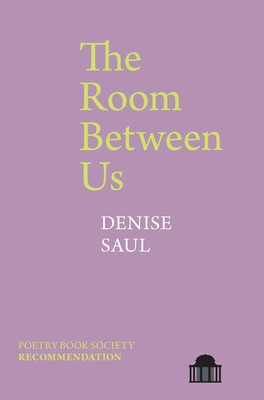The Room Between Us (Shortlisted, TS Eliot Prize)
Denise Saul
(Pavilion Poetry, 2022); pbk £9.99
London-born poet Denise Saul writes from the heart about her experience of being her mother’s carer in this tender debut collection of prose and free verse poetry.
One of the first pages provides a definition of the word ‘stroke’, which seems significant, acting as a bridge between the first two poems. Significant too in its placement in the collection – directly after the titular poem: ‘The Room Between Us’. This poem gives us an insight into Saul’s feeling finding her mother lying alone having fallen, with the lights out, behind a door at home:
[…]
I give up trying to lift you from the floor
as the room is no longer between us.
You point again to the Bible, door, wall,
before I whisper, It’s alright, alright,
now tell me what happened before the fall.
Whispering is such a careful way to speak to someone, and the fact that the poet has chosen this word to enquire after what happened suggests a tender relationship between mother and daughter, evident also in the act of gentle reassurance portrayed. Tone is clearly more considered with caregiving duties, providing some context and setting, and infusing the pace and timbre in the reading of subsequent poems.
One thing I notice with many of the entries in this collection is that they are almost reportage and narrative in style, and many are without rhyme. ‘The White Room’, for example, is in free verse and this makes me wonder if writing poetry is an act of documentary witness and healing for the poet during this time in her life. One line from this piece sums up effectively the experience of waiting in a medical room:
There is a moment for meditation when the doctor leads me
into the room with table, bed and cupboard. When he leaves, I
look out of the small window. There’s a view of other windows,
unknown. […]
The clinical room’s basic features are things that readers can undoubtedly envision and relate to. The alliteration of the letter ‘m’ used in the phrase ‘moment for meditation’ almost mimics the sound of a calming chant. The discomfort felt in this room is a stark contrast to the familiarity of her mother’s room in ‘The Room Between Us’; the drab décor mirrors the unpleasant feeling of waiting for an extended time.
We learn of the strength and stubbornness of the poet’s mother in the poem ‘Surrender’, where Saul, trying to comb her hair, explains:
[…] I tell mother
to bend her head forward, You have to lean forward if you want
me to comb your hair. Mother tilts her head back because
she does not want to surrender to anyone.
Here, the poet shares with us the attitude and personality of her mother who must dislike being a patient. Using italics here, we can assume she is speaking in a soft whisper again to her mother, as she did in the title poem.
Estrangement from her mother grows with the latter’s illness; aphasia leads to verbal communication being increasingly difficult or non-existent. In ‘No Word for Blue’, Saul writes with brutal honesty, ‘She who is quiet is boring company’; and as the poem progresses, we learn that,
In colour theory, green is complementary to red. I watch a ladybird meditate on the grass.
This metaphor beautifully describes how Saul and her mother are complete opposites at this stage, yet they are also finding ways to exist together. Though they cannot communicate directly, they need each other to maintain inner peace.
The Room Between Us is energetic but delicate, covering issues of care, family love, dread, and reflection in a very personal and contemporary way.
Lauren-Marie Kennedy


Leave a Reply